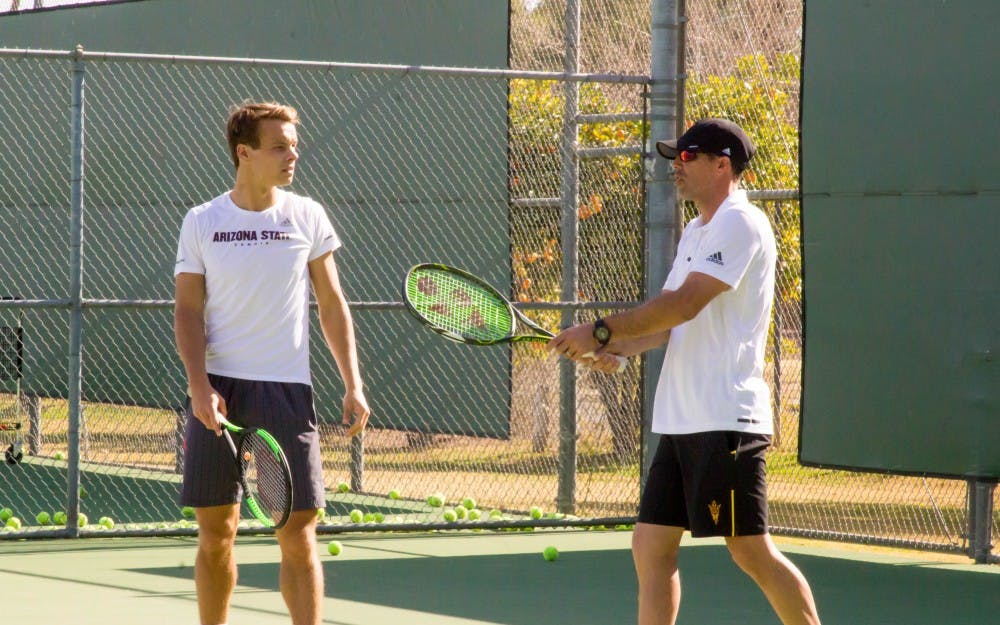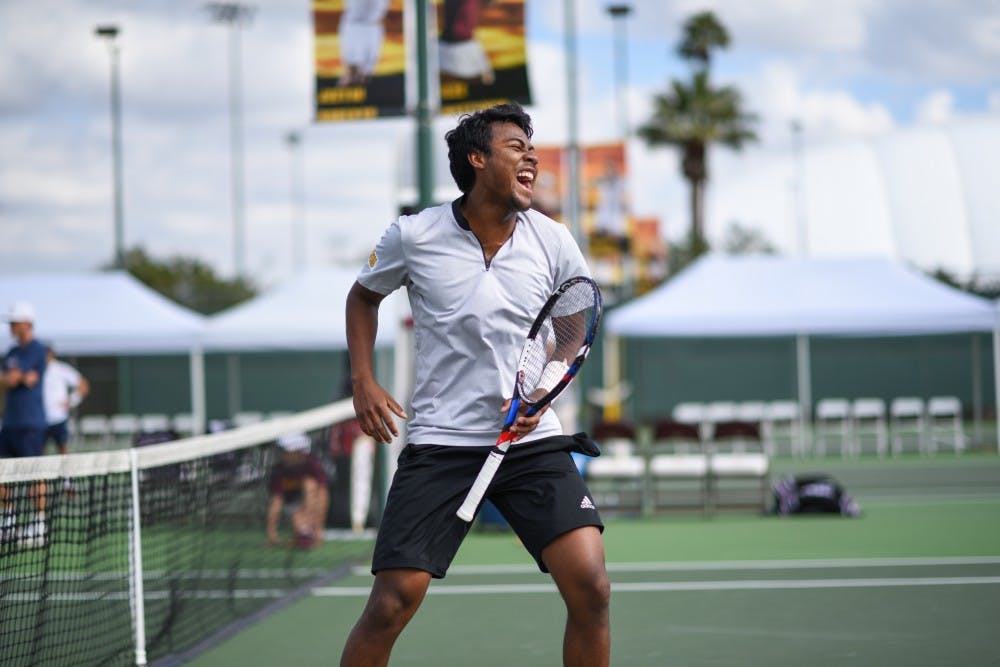In 2016, ASU reinstated its men's tennis program, becoming the first Power Five university ever to do so after cutting the team eight years prior due to budgetary issues.
The Sun Devils didn’t take the court until the 2017-18 season, but, led by head coach Matt Hill, the team quickly climbed the ranks, locking in a top five recruiting class nationally before reaching the NCAA tournament and ranking as high as No. 13 in the country in their debut campaign.
Now, heading into what will be their third full season since the revival, the Sun Devils return their top three singles players from last season and bring in another top 10 recruiting class.
To Hill, the success wasn't cause for celebration — it was the expectation.
“The goal was always to build a team at the very top of collegiate tennis,” Hill said.
Hill's experience with success
As an assistant coach at Alabama and Mississippi State, Hill helped programs that were ranked in the 50s nationally to the top 15 by his departure, in just two and five seasons, respectively.
Following those stops, in 2012 Hill began a four-year tenure as head coach of the South Florida Bulls. He inherited a team that had gone 9-12 in the previous season and had been to the NCAA tournament just twice in the last decade.
After bringing in a top 10 recruiting class in just one season, he was then recognized as the American Athletic Conference’s “Coach of the Year” in each of his last three seasons, leading the Bulls to three straight NCAA tournament appearances and conference titles.
He still expected more.
“Our goal was always to be No. 1,” Hill said. “I have a difficult time settling for anything less.”
He said that drive is what brought him to ASU: his desire to be challenged, uncomfortable and solve problems is what "gets (him) up in the morning" — and it goes beyond results on the court.
He said a realization struck him as an assistant at Mississippi State in 2011 when the Bulldogs’ convincing win over fourth ranked Tennessee left him unfulfilled.
“I think a lot of coaches and athletes have (those) moments in their career, where they do something really special — they win a national championship or they win the World Series — and as they're going home, they're like, ‘Man, that's all it is?’” Hill said. “This has to be about more than just tennis, or, in my mind, I’m wasting my time and I should go do something else.”
Accordingly, Hill’s vision of a successful program is “holistic.”
“We want to be a model that people look at and say, they’re successful on the court, they're successful in the classroom, they have an incredible following, their alumni group is connected — they have the whole package,” Hill said.
Establishing an identity
At the core of realizing that vision is the type of player Hill recruits — not on the court, but off of it, ASU assistant coach Dominic Cotrone said.
“A lot of coaches will look at a player and say, 'That guy's a very good tennis player. We want him on the team.' Matt’s recruiting process is a little bit more rigorous than that,” Cotrone said.
Hill emphasizes determining if a recruit will fit in with the “DNA” of the program, Cotrone said. That process often involves focusing on a recruit's character, behavior on the court, family dynamics and desire to one day play professionally, which generally indicates high motivation.
“Within a week, you feel like part of that family,” Cotrone said. “You end up playing better, because you want to run through a brick wall for (your teammates).”
That very dynamic attracted Cotrone to join forces with Hill as a player. A former five star recruit, Cotrone transferred from Florida State in 2014, where he was playing No.1 singles, to join Hill and a USF program that had impressed him from afar.
“I vividly remember speaking to my parents, and they said, ‘If you're going to go somewhere, you're going to go play for Matt Hill at South Florida,’” Cotrone said. “‘When we watch you guys play them, it looks like you're a team of individuals playing against a real team that's connected, playing well and having fun on the court. That's the atmosphere that we think you'll become a better tennis player in.’”
Hill believes the strength of that vision and atmosphere has brought him success in recruiting to programs that may not have storied histories, or — in ASU’s case — even existed five years ago.
“It's just a matter of if the recruit can then take the leap of faith with you that, ‘yeah, we can do this together. We can build something special,’” Hill said.
In describing his vision to a recruit, Hill believes transparency is essential, and honest dialogue is the route to ensuring that each player’s decision to join the program is mutually beneficial.
“We don't recruit by selling Arizona State. When you go about it that way, you invariably are going to be highly biased, and you’re not building trust with the recruit,” Hill said. “You're not going to hear what's important to them, so you don't know if you can really help them, because you don't really know what their needs are and what their dominant motive is to join a program.”
Freshman Max McKennon, a top 10 American recruit in his class and the 62nd ranked International Tennis Federation junior in the world, said Hill's transparency set him apart as a coach in the recruiting process.
“I could tell by the tone of his voice that he really meant what he was saying and that he would deliver on everything,” McKennon said.
Building from the ground up
In ASU’s first season back, the elite talent was Michael Geerts, then a gifted 21-year-old pursuing a professional career. Geerts had never intended on playing college tennis, but he was in danger of losing his support from the Royal Belgian Tennis Federation due to his ranking, which would inhibit his ability to continue playing on tour.
So Hill offered Geerts a solution that he felt would help them both: Come play at ASU.
After going 25-12 in his lone season as a Sun Devil, Geerts is now pursuing his professional full-time career, having won two ITF Futures titles in 2019 and rising as high as No. 347 in the ATP rankings.
The year after Geerts, the talent was Nathan Ponwith, now a senior at ASU. At the time, Ponwith was a former No. 1 American recruit who had just been dismissed from the University of Georgia’s team as a sophomore, following drug charges.
Hill said Ponwith’s situation was one in which he had to ensure that, regardless of talent, Ponwith had the right intentions, was the right fit and could be truly helped at ASU.
“I think the decision to bring Nate into the program and into our family and love him, trust him and care for him as a human being during that time is, hopefully, a reflection of (our values),” Hill said.
Ponwith said despite the difficult circumstances, Hill’s approach made him feel as if there was “no risk” in joining a program that had only been around for one year.
“You always look for somewhere you can go and feel comfortable, like these people have got your back and you can trust them,” Ponwith said. “It just felt like home.”
Two years later, Hill believes Ponwith has blossomed as both a player and a leader.
“It's a special story,” Hill said. “You have a guy who has really made massive changes in his life, and has given himself a chance at using the sport as a career and a platform.”
Leadership leads the way
Internal leadership from players like Ponwith is essential to Hill’s vision, and entering this season, he sees Ponwith and senior Makey Rakotomalala, another former top 50 ITF junior, filling that role.
“They bring leadership to a program that hasn't had leadership since before it was reinstated,” Hill said.
Rakotomalala, who first joined the team when it only had five committed players, said he feels a responsibility to perpetuate that vision that inspired his leap of faith four years ago. Freshman Spencer Brachman said he has succeeded at that task.
“Even before I got here, (Ponwith and Rakotomalala) were both reaching out to me, calling me, asking how my training was going,” Brachman said. “Since I've been here, they've been guiding me on and off the court.”
Once that culture is in place, “the results are just a byproduct,” Hill said.
Reach the reporter at cbreber@asu.edu and follow @carsobi on Twitter.
Like State Press Sports on Facebook and follow @statepresssport on Twitter.





